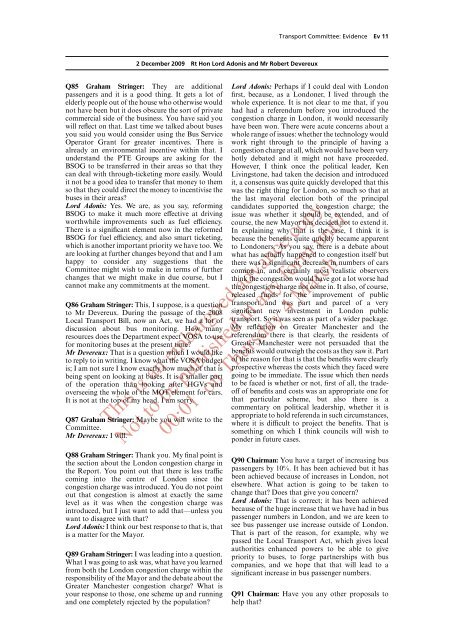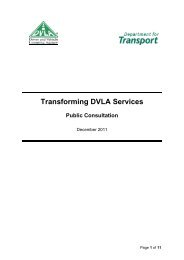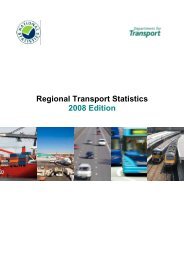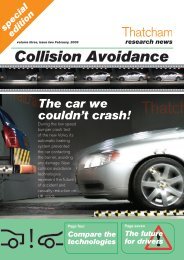The performance of the Department for Transport - Fleet News
The performance of the Department for Transport - Fleet News
The performance of the Department for Transport - Fleet News
Create successful ePaper yourself
Turn your PDF publications into a flip-book with our unique Google optimized e-Paper software.
Processed: 26-02-2010 19:09:54 Page Layout: COENEW [O] PPSysB Job: 442441 Unit: PAG1<strong>Transport</strong> Committee: Evidence Ev 112 December 2009 Rt Hon Lord Adonis and Mr Robert DevereuxQ85 Graham Stringer: <strong>The</strong>y are additionalpassengers and it is a good thing. It gets a lot <strong>of</strong>elderly people out <strong>of</strong> <strong>the</strong> house who o<strong>the</strong>rwise wouldnot have been but it does obscure <strong>the</strong> sort <strong>of</strong> privatecommercial side <strong>of</strong> <strong>the</strong> business. You have said youwill reflect on that. Last time we talked about busesyou said you would consider using <strong>the</strong> Bus ServiceOperator Grant <strong>for</strong> greater incentives. <strong>The</strong>re isalready an environmental incentive within that. Iunderstand <strong>the</strong> PTE Groups are asking <strong>for</strong> <strong>the</strong>BSOG to be transferred in <strong>the</strong>ir areas so that <strong>the</strong>ycan deal with through-ticketing more easily. Wouldit not be a good idea to transfer that money to <strong>the</strong>mso that <strong>the</strong>y could direct <strong>the</strong> money to incentivise <strong>the</strong>buses in <strong>the</strong>ir areas?Lord Adonis: Yes. We are, as you say, re<strong>for</strong>mingBSOG to make it much more eVective at drivingworthwhile improvements such as fuel eYciency.<strong>The</strong>re is a significant element now in <strong>the</strong> re<strong>for</strong>medBSOG <strong>for</strong> fuel eYciency, and also smart ticketing,which is ano<strong>the</strong>r important priority we have too. Weare looking at fur<strong>the</strong>r changes beyond that and I amhappy to consider any suggestions that <strong>the</strong>Committee might wish to make in terms <strong>of</strong> fur<strong>the</strong>rchanges that we might make in due course, but Icannot make any commitments at <strong>the</strong> moment.Q86 Graham Stringer: This, I suppose, is a questionto Mr Devereux. During <strong>the</strong> passage <strong>of</strong> <strong>the</strong> 2008Local <strong>Transport</strong> Bill, now an Act, we had a lot <strong>of</strong>discussion about bus monitoring. How manyresources does <strong>the</strong> <strong>Department</strong> expect VOSA to use<strong>for</strong> monitoring buses at <strong>the</strong> present time?Mr Devereux: That is a question which I would liketo reply to in writing. I know what <strong>the</strong> VOSA budgetis; I am not sure I know exactly how much <strong>of</strong> that isbeing spent on looking at buses. It is a smaller part<strong>of</strong> <strong>the</strong> operation than looking after HGVs andoverseeing <strong>the</strong> whole <strong>of</strong> <strong>the</strong> MOT element <strong>for</strong> cars.It is not at <strong>the</strong> top <strong>of</strong> my head. I am sorry.This is an embargoed advance copy.Not to be published in any <strong>for</strong>m until00:01 on Thursday 4 MarchQ87 Graham Stringer: Maybe you will write to <strong>the</strong>Committee.Mr Devereux: I will.Q88 Graham Stringer: Thank you. My final point is<strong>the</strong> section about <strong>the</strong> London congestion charge in<strong>the</strong> Report. You point out that <strong>the</strong>re is less traYccoming into <strong>the</strong> centre <strong>of</strong> London since <strong>the</strong>congestion charge was introduced. You do not pointout that congestion is almost at exactly <strong>the</strong> samelevel as it was when <strong>the</strong> congestion charge wasintroduced, but I just want to add that—unless youwant to disagree with that?Lord Adonis: I think our best response to that is, thatis a matter <strong>for</strong> <strong>the</strong> Mayor.Q89 Graham Stringer: I was leading into a question.What I was going to ask was, what have you learnedfrom both <strong>the</strong> London congestion charge within <strong>the</strong>responsibility <strong>of</strong> <strong>the</strong> Mayor and <strong>the</strong> debate about <strong>the</strong>Greater Manchester congestion charge? What isyour response to those, one scheme up and runningand one completely rejected by <strong>the</strong> population?Lord Adonis: Perhaps if I could deal with Londonfirst, because, as a Londoner, I lived through <strong>the</strong>whole experience. It is not clear to me that, if youhad had a referendum be<strong>for</strong>e you introduced <strong>the</strong>congestion charge in London, it would necessarilyhave been won. <strong>The</strong>re were acute concerns about awhole range <strong>of</strong> issues: whe<strong>the</strong>r <strong>the</strong> technology wouldwork right through to <strong>the</strong> principle <strong>of</strong> having acongestion charge at all, which would have been veryhotly debated and it might not have proceeded.However, I think once <strong>the</strong> political leader, KenLivingstone, had taken <strong>the</strong> decision and introducedit, a consensus was quite quickly developed that thiswas <strong>the</strong> right thing <strong>for</strong> London, so much so that at<strong>the</strong> last mayoral election both <strong>of</strong> <strong>the</strong> principalcandidates supported <strong>the</strong> congestion charge; <strong>the</strong>issue was whe<strong>the</strong>r it should be extended, and <strong>of</strong>course, <strong>the</strong> new Mayor has decided not to extend it.In explaining why that is <strong>the</strong> case, I think it isbecause <strong>the</strong> benefits quite quickly became apparentto Londoners. As you say, <strong>the</strong>re is a debate aboutwhat has actually happened to congestion itself but<strong>the</strong>re was a significant decrease in numbers <strong>of</strong> carscoming in, and certainly most realistic observersthink <strong>the</strong> congestion would have got a lot worse had<strong>the</strong> congestion charge not come in. It also, <strong>of</strong> course,released funds <strong>for</strong> <strong>the</strong> improvement <strong>of</strong> publictransport and was part and parcel <strong>of</strong> a verysignificant new investment in London publictransport. So it was seen as part <strong>of</strong> a wider package.My reflection on Greater Manchester and <strong>the</strong>referendum <strong>the</strong>re is that clearly, <strong>the</strong> residents <strong>of</strong>Greater Manchester were not persuaded that <strong>the</strong>benefits would outweigh <strong>the</strong> costs as <strong>the</strong>y saw it. Part<strong>of</strong> <strong>the</strong> reason <strong>for</strong> that is that <strong>the</strong> benefits were clearlyprospective whereas <strong>the</strong> costs which <strong>the</strong>y faced weregoing to be immediate. <strong>The</strong> issue which <strong>the</strong>n needsto be faced is whe<strong>the</strong>r or not, first <strong>of</strong> all, <strong>the</strong> tradeoV<strong>of</strong> benefits and costs was an appropriate one <strong>for</strong>that particular scheme, but also <strong>the</strong>re is acommentary on political leadership, whe<strong>the</strong>r it isappropriate to hold referenda in such circumstances,where it is diYcult to project <strong>the</strong> benefits. That issomething on which I think councils will wish toponder in future cases.Q90 Chairman: You have a target <strong>of</strong> increasing buspassengers by 10%. It has been achieved but it hasbeen achieved because <strong>of</strong> increases in London, notelsewhere. What action is going to be taken tochange that? Does that give you concern?Lord Adonis: That is correct; it has been achievedbecause <strong>of</strong> <strong>the</strong> huge increase that we have had in buspassenger numbers in London, and we are keen tosee bus passenger use increase outside <strong>of</strong> London.That is part <strong>of</strong> <strong>the</strong> reason, <strong>for</strong> example, why wepassed <strong>the</strong> Local <strong>Transport</strong> Act, which gives localauthorities enhanced powers to be able to givepriority to buses, to <strong>for</strong>ge partnerships with buscompanies, and we hope that that will lead to asignificant increase in bus passenger numbers.Q91 Chairman: Have you any o<strong>the</strong>r proposals tohelp that?









